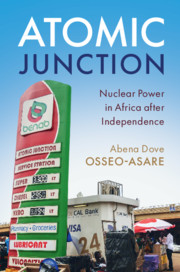'A carefully researched but also deeply personal history of nuclear science in Ghana. Osseo-Asare’s history takes us from Ghanaian nuclear scientists’ measurements of fallout from French nuclear tests in Algeria in the early 1960s through to Ghana’s acquisition of a nuclear reactor from China in the 1990s, and further into the present day. Commendable for its breadth of perspective and fascinating detail.'
Hugh Gusterson - George Washington University, Washington, DC
'A meticulous historian with an ethnographer’s eye for rich detail, Osseo-Asare boldly overturns standard accounts of Cold War atomic science, placing Ghanaian aspirations for decolonized knowledge and talented black researchers at the center. A brilliant and utterly original rendering of one nation’s nuclear dreams that are at once liberatory and frustrated.'
Alondra Nelson - President of the Social Science Research Council
‘… a well-rounded account of an independent African country’s nuclear past. Given the author’s family ties to Ghana and particularly to the Ghanaian community of nuclear scientists, the story reflects a very personal engagement with the subject. Osseo-Asare has most likely produced the authoritative account of Ghana’s nuclear endeavor, including its achievements and setbacks, in a clear and balanced manner.’
Robin Möser
Source: African Studies Review
‘Atomic Junction is a pleasure to read. Osseo-Asare writes with flair and weaves together evidence from a range of archival and oral narratives with major themes in the history of atomic power, science in the Cold War, decolonization, and social and cultural history … This undoubtedly is an important contribution to the growing literature in the history of science and technology in postcolonial Africa.’
Jeremy M. Rich
Source: H-Africa
‘Atomic Junction is a great feat of multidisciplinary research presented in a tightly written and lucid narrative.’
Damilola Adebayo
Source: Technology and Culture
‘… a masterful contribution to the growing scholarship on the history of science and technology in Africa.’
Jennifer Hart
Source: H-Africa
‘… as an examination of the scientific community of a post-colonial African country, the book is impressive. Abena Osseo-Asare documents in detail the Ghanaian attempt to harness nuclear power and, through extensive interviews and Ghanaian and other archive materials, provides insight into the struggle for international equality and into the social negotiation processes and discourses of an African country.’
Anne-Kristin Hartmetz
Source: WerkstattGeschichte
‘The book’s contribution to the growing body of scholarship on nuclear power in Africa is difficult to overstate. Beyond this, it will interest a wide range of Africanists, historians of science, medicine and technology, and scholars of post-colonial and development studies. The book’s readability makes it accessible for university curricula, and indeed it represents an indispensable addition to reading lists on the histories of the Global South in science and technology.’
Chloë Mayoux
Source: Journal of African Military History



